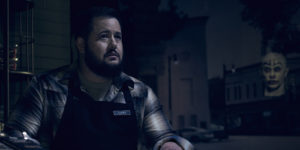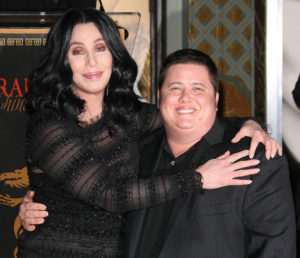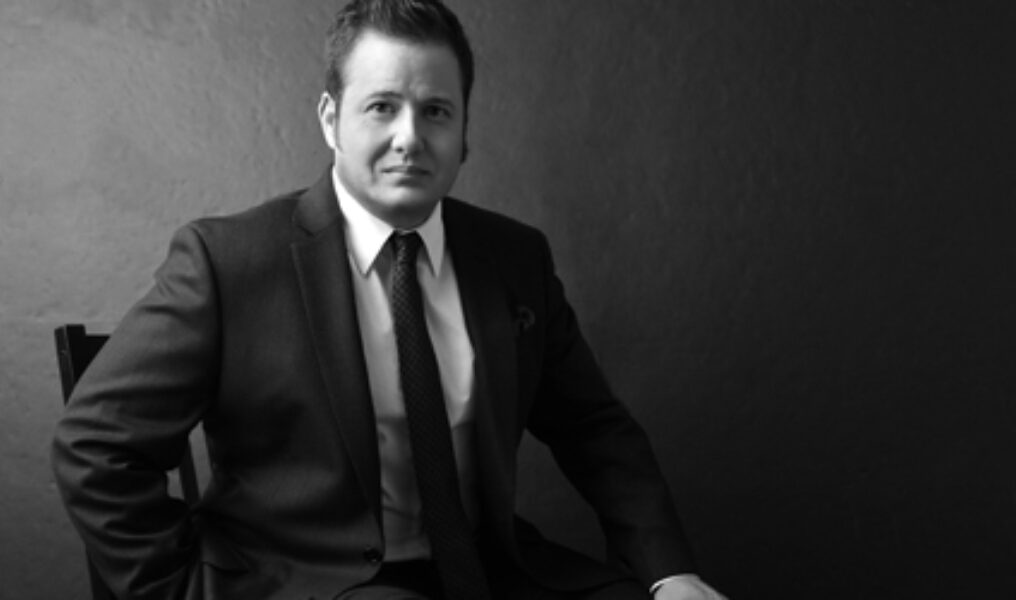As radical right-winger Gary Longstreet on last year's "American Horror Story: Cult," a far cry from his own liberal leanings, Chaz Bono had his breakout role at the age of 48. Why did it take so long for Bono, who just happens to be Cher's transgender son, to make his mark as an actor?
Because Bono was often in conflict with the female gender of the person he was playing but didn't know why.
At least not at first.
Then, suddenly, his interest in male roles changed more than just his acting career – in 2009, the activist transitioned from female to male. Years later, in 2016, Bono followed a recurring role as Reverend Rydale on "The Bold and the Beautiful" with a foray into Ryan Murphy's "American Horror Story" anthology, first on "Roanoke" and then on the prolific TV creator's grisly Trump-era "Cult."
Here, Bono opens up about why understanding his gender identity was the long first step to acting again, the "bizarre" possibility of working with mom Cher and what he's learned about LGBTQ representation from trans youth.
One of my favorite parts of you starring in "American Horror Story: Cult" was reading your mom's tweets about the show.
You know, she gets confused a little bit. (Before I was killed off) she was in Vegas, and she and her best friend Paulette did a binge of the show, but they didn't know I had gotten killed already, so I think that was a realization. She tweeted me about that and was like, "Was this on yet?"
What was it like to be part of a show that is steeped in total conservative radicalism with a cast that is so LGBTQ-oriented? The contrast is so ironic.
Yeah, it was interesting, 'cause I would say, for me, I had two very distinctive experiences on the show. The first part of it was what you just said: very steeped in a lot of people in the community, and then those who are just incredibly open-minded. But then all of these guys come in and I started spending all of this time with all of these young actors and extras, and it suddenly became a different experience. That was the first time for me that I started to feel like I was in a cult, and started to experience what that feels like and the comfort it brings.

Photo: Frank Ockenfels/FX
Are you saying you could understand the appeal of a cult?
I could understand the appeal a little bit, yeah. I'm somebody who keeps up with the news obsessively, but there was something really nice about when I'd go to work, turning my brain off and being with a bunch of younger actors who were really exuberant, like this full-on, testosterone-driven experience of all of us hooting and hollering and just waiting on every word that Evan (Peters) would say as (cult leader) Kai. That group mentality is very – I understood how it could be very seductive at certain times.
I found it seductive too, but I couldn't figure out how much of that was because the guys were so hot.
(Laughs) Well, yeah, that didn't really do it for me, but some of the guys were really great actors. We got along really well, because I've done a lot of theater and I've been at my acting studio for five years now. I'm used to being around younger actors because I haven't been incredibly successful in my career, so I'm around young actors all the time, so I feel very comfortable and know what it's like to be the new guy, because that's how I felt last season (on "Roanoke"). We kind of all bonded (on "Cult"), and it was just this really strange experience, like this group mode mentality. And you know, we were obnoxious. It definitely became a presence on set – and, I mean, I think I was maybe less obnoxious because I'm 48. (Laughs)
Why have you purposefully avoided playing trans roles?
It's really a twofold thing. First of all, I really consider myself a character actor, and I really like playing parts that are very different from myself. That's what I enjoy about acting, that's what's fun for me, and I think it's what I'm really good at.
I don't really have any interest in playing a trans guy because I don't want to play something that's close to me. If I wasn't trans, I probably would wanna play a trans person because that's the kind of actor I am, but it doesn't interest me that much because I've seen so many actors that I know who are trans playing trans parts and I wanted to try to establish myself as not that. I wanted to show people that that's just a ridiculous thing and I didn't want to get pigeonholed, so I just waited and took small stuff here and there that wasn't that because it's just not the career that I want.
While working for GLAAD as entertainment media director in the '90s, you were a consultant on Ellen DeGeneres' sitcom, "Ellen." Considering the show's lead, Ellen, is gay, what did it mean to be a consultant on that show?
I looked over scripts. I was doing a lot with them as far as – there was a tremendous amount of press and hoopla around the coming out stuff. We were working to coordinate a lot of that stuff for her, and then doing a lot of press because she did so little. So, picking up a lot of slack. I was actually on one of the episodes right after the coming out episode, which was fun, and just kind of there for them. It's so long ago that I just remember always being there and always organizing shit around that.
She's a lesbian, so she knows how to portray that (laughs). But there were other questions that came up about other stuff related to the community and little specifics here and there about being a lesbian. You'd probably be surprised to find out that – because one of my good friends is the guy who handles all trans stuff for GLAAD, and so I know this – about the number of calls that he gets from actors, writers, producers and people who want to get it right.

Cher and Chaz Bono at Cher's Hand and Footprint Ceremony, Grauman's Chinese Theatre, 2010.
You hear stories from celebrities who don't necessarily want their child to go down the same showbiz path they did. Was that the case for you growing up?
No, not at all. My mom was actually the one who got me into acting. I was 14 and a really miserable kid in middle school, not relating to other kids at my school and just really unhappy, and my mom made me go to an acting class. I was kind of like, "Oh god, why do I have to do this?" and I ended up totally falling in love with it. Then, I auditioned for a performing arts high school and got in and moved to New York, so yeah, my mom has always been incredibly supportive of creative endeavor.
Regarding your sexuality and gender identity, I know you've gone through a lot with her.
She has evolved a lot!
She's getting the pronouns right these days?
She does get the pronouns right. Now she just gets mixed up and calls me my brother's name. (Laughs)
Ha! Well, every mother does that.
Yeah, right! But yeah, she's been supportive. For me, I didn't know that I was trans at the time, but it was the issue that made me stop acting. I knew that I couldn't play women. And I didn't really know why at that point. I chalked everything up to being gay and masculine.
When did you come to the realization that you couldn't play female roles?
I was 18. I was a senior in high school and I got cast as a male in "A Midsummer Night's Dream," our big senior production at performing arts, and it was the first time that I really felt like I knew what I was doing and felt comfortable and was really good. It was like, "OK, why do I have a handle on playing a middle-aged man? Why is that easier than playing a teenage girl?"
Did you process this on your own? Did you talk to your mom?
No, I didn't process it on my own. And I couldn't – I wasn't out to my mom. My mom did not handle the coming out thing well, so no, trans wasn't there yet and what I knew was, OK, clearly as a working actor I wouldn't be able to go out for these parts. But this was the first time I really loved acting and it didn't feel like a struggle. It was fun and joyous and "wow." Honestly, it didn't really strike me until I started to realize I was transgender and looking back over my life for evidence when I was in that fact-finding part of the journey of trying to figure it out.
It's a weird thing, because on the one hand I try to emphasize that being transgender doesn't affect my acting at all, which it doesn't – I'm just an actor who happens to be transgender – but what it did affect was that, unfortunately, I started doing what I love so late in life because it happens to be a profession where you have to be comfortable and in the right body to do it.
I imagine now you're hustling for roles.
Always hustling.
What's next for you acting-wise? Will we see you on this year's season of "American Horror Story"?
I don't know. I mean, yeah, I've got little projects and stuff that I'm working on, but that kind of stuff takes forever. I'm hoping to have a better pilot season than last year and, yeah, we'll see.
Are you interested in self-financing and self-directing? Have you collaborated on any projects with your mother?
No, I haven't collaborated with her. Yeah, that I would probably do. That would be so bizarre, but I think she's very talented (laughs). But I don't have any interest in directing. I'm just not a very visual person, but I do have an interest in getting projects off the ground and producing. I produced a play out here – a Lee Blessing play called "Down the Road" – and I would probably do more.
As GLAAD's former entertainment media director, are you encouraged by the increase in trans representation in media? What do you see as far as trans representation goes?
It's really interesting because I facilitate a group once a month with a bunch of other people for an organization that I'm on the board of. It's a big organization with lots of moving parts, but I facilitate a group for trans youth, and so we had a conversation recently and all these trans kids – basically middle school through college – were talking about representation. It was interesting to hear from them, because as an adult with a long life growing up in the '80s where there was – forget about no trans representation, there was no gay or lesbian representation – my feeling is, "Wow, we've come so far."
But, listen, these kids they were like, "God, why am I not seeing XY and Z? I'm not seeing this, and I'm not seeing that." It was a really interesting perspective to see because, yeah, we've come a long way, but there's still a long way to go. And the people who need to see themselves reflected in media really badly are not getting their needs met. The number of trans youth just seems to be growing vastly and they are not seeing themselves represented, and when they are, it's the same story. It's always about figuring it out and transitioning and they're like, "I don't want to see that anymore. I want to see a trans person in sci-fi. I want to see a trans person in fantasy. I want to see trans people represented in the kind of stuff that I like. I'm not seeing that."
Is that something you want to see as well?
Honestly, it's not something I think about that much. My life is so much about my acting career, and so what I want is to just get more work (laughs), so it's hard. And when I think about politics or that kind of stuff, there is, to me, just so many bigger fish to fry. It's been so long for me since I needed to see myself reflected in anything that you forget, so it was an interesting lesson. Because I don't need to see myself reflected. I don't need to relate to a character because they're trans. If I were to say all of the things that I am, trans is at the bottom of my list, so it doesn't affect my life in any way. It's just a thing. It's not a part of my identity at all.
Does the fact that last year we elected trans officials, such as Danica Roem of Virginia, excite you?
Yeah, totally, that was amazing. That was awesome. That was a little bit more exciting, but I have to say I also get excited about any person that is a minority – that is the first person to get, in this climate, ahead.
So, any people of color, people of Muslim faith, anybody who is marginalized. Because at this point in my life, I see us all as the same thing. I really don't differentiate. To me, I've evolved to the point where we're all the same, and I think if everybody could get there we'd be such a very large, strong majority. So, I was really excited by all the women who took office, and there was a woman of color who got elected where that had never happened before, so all those milestones were exciting for me.











